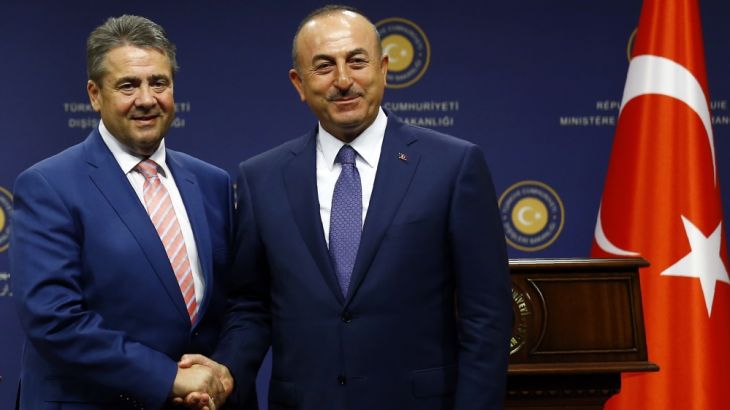Turkey accuses Germany of harbouring ‘terrorists’
Reaction follows German threat to slap sanctions and decision to issue travel advisory amid row over activists’ arrest.

Mevlut Cavusoglu, Turkey’s foreign minister, has accused Germany of harbouring “terrorists” after the country stepped up a travel advisory for Turkey and considered slapping sanctions over its arrest of human rights activists.
Germany told its citizens on Thursday to exercise caution if travelling to Turkey, with Sigmar Gabriel, foreign minister, warning that his government could no longer guarantee its citizens’ safety in the face of “arbitrary” mass arrests.
The warning came after Turkey arrested six human-rights activists, including a German national, on accusations of “terrorism”.
READ MORE: Rejected asylum – From Karachi to Germany and back again
Germany, Turkey’s chief export partner, called the allegations absurd.
Gabriel said Germany would review state guarantees for foreign investment in Turkey, and reconsider its support for billions in European Union financial flows to Turkey.
Germany’s Bild newspaper, citing government sources, reported that the country was also putting arms projects involving Turkey on hold.
Stance ‘unacceptable’
Cavusoglu called Germany’s stance “unacceptable”.
“As a country providing shelter to PKK and FETO terrorists in its own territory, statements by Germany are just double standards and unacceptable,” he said on Twitter, referring to the Kurdistan Workers Party and the network of the US-based religious leader Fethullah Gulen, blamed by Turkey for last year’s failed coup.
Germany and Turkey have clashed over numerous issues in recent months, including the pre-trial detention of a Turkish-German journalist, Deniz Yucel, and Germany’s refusal to extradite asylum seekers Turkey alleges were involved in the coup attempt.
|
|
The latest row broke out after a Turkish court on Tuesday ordered six rights activists, including German national Peter Steudtner and Amnesty International’s Turkey director Idil Eser, to remain in custody for allegedly aiding a “terror” group.
Gabriel broke off his holiday to deal with the crisis.
He said Steudtner “never wrote about Turkey, he had no contacts in the political establishment … and never appeared as a critic.”
He said any German national travelling to Turkey could suffer the same fate.
Gabriel also accused President Recep Tayyip Erdogan of trying to muzzle “every critical voice” with mass arrests.
Erdogan says the crackdown, in which roughly 50,000 people have been detained and 150,000 sacked or suspended from the judiciary and journalism to academia, was essential after the failed coup.
Many companies have also been seized on allegations of links to “terrorism”.
Without legal certainty
Gabriel said he could not advise companies to invest in a country without legal certainty where “even completely innocent companies are judged as being close to terrorists”.
“I can’t see how we as the German government can continue to guarantee corporate investments in Turkey if there is the threat of arbitrary expropriation for political reasons.”
Germany still wanted to rebuild relations with its long-time ally, he said, but added that Erdogan’s government must first “return to European values”.
Juergen Hardt, a senior member of Chancellor Angela Merkel’s ruling conservative party, said the EU candidate country had now “left the path to Europe”.
![Gabriel, left, and Cavusoglu have engaged in a war of words over the Turkish arrests [File: AP]](/wp-content/uploads/2017/07/6c9e5521ebd6480fbbbbf593ffcd9899_18.jpeg)
“No one invests in a country … in which the judiciary has been degraded to be a helper of the ruling AKP party,” he said.
Cavusoglu hit back at Gabriel’s remarks, saying threats and blackmail would find no answers in Turkey, and that Germany and Turkey needed to focus on their long-term mutual goals instead.
“We don’t see such threats against Turkey as worthy of a serious country,” Cavusoglu said in Cyprus.
The foreign ministry in Ankara said Turkey would not make concessions on its judicial independence and struggle against “terrorism” “for financial matters such as loans, funds or the [European] Customs Union”.
READ MORE: Germany to withdraw troops from Turkish base
For his part, Ibrahim Kalin, Turkey’s presidential spokesman, accused Germany of “great political irresponsibility” in stepping up its travel warning.
He suggested Gabriel’s remarks were intended to win votes at national elections in two months. “They need to rid themselves of this abdication of reason and think rationally,” Kalin said.
Gabriel’s warnings to private as well as business travellers could deal a blow to Turkey’s tourism industry. So far this year, bookings from Germany have accounted for about 10 percent of Turkey’s tourists.
List of companies
The German newspaper Die Zeit reported on Wednesday that Turkish authorities had, several weeks ago, handed their German counterparts a list of 68 German companies they accused of having links to Gulen.
They included chemicals manufacturer BASF, which confirmed it was on a list that had been passed to it by German police but declined to comment on the allegations.
Mehmet Simsek, Turkey’s deputy prime minister, said on Thursday the reports were untrue.
Germany was Turkey’s top export destination in 2016, buying $14bn worth of Turkish goods.
It was also the second biggest source of Turkish imports, at $21.5bn. Only China, at $25.4bn, exported more to Turkey.